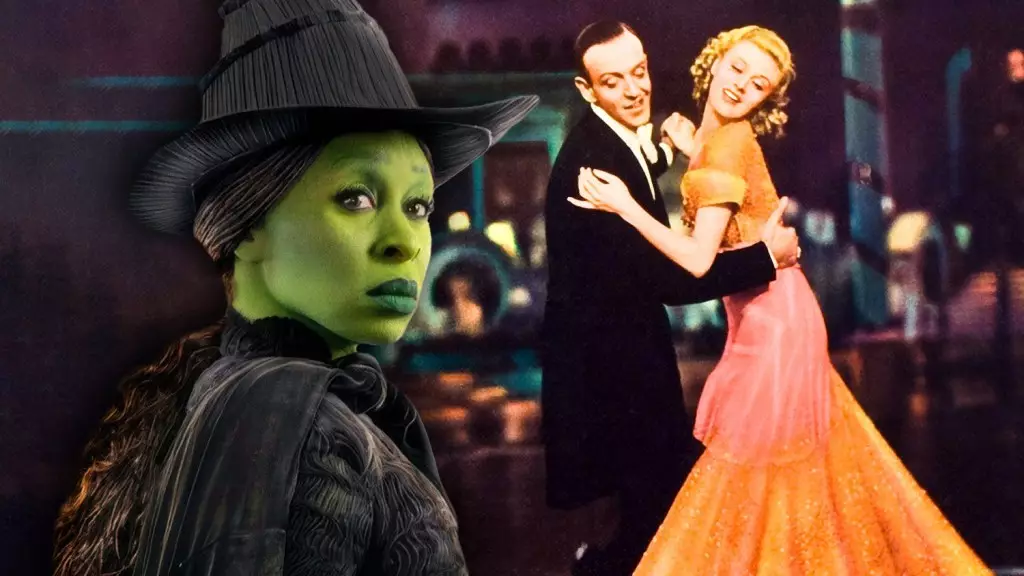In the wake of the Covid pandemic, many turned to the uplifting melodies and captivating choreography of old MGM musicals as a means of escapism. Classics like **Singin’ in the Rain** and Fred Astaire’s impeccable moves in **Top Hat** offered solace during turbulent times. These timeless works are more than just entertainment; they represent islands of joy where audiences could momentarily forget their worries. However, upon examining the current landscape of musicals, it’s evident that while they might mirror the success of their predecessors—garnering numerous awards and impressive box office figures—the tone has shifted significantly. The contemporary musical often leans toward a narrative filled with complexity and emotional depth rather than sheer exuberance.
For many fans of musicals, the latest cycle has offered a mixed bag of performances. The enthusiasm surrounding modern adaptations is palpable; award nominations are flooding in for a star-studded lineup including Timothée Chalamet, Selena Gomez, and Ariana Grande among others. Although these performances do showcase significant talent, they diverge from the simplicity of the past. Universal Pictures celebrates the financial success of productions like **Wicked**, which has grossed over $500 million, indicating a solid re-establishment of the musical genre within the film industry.
Yet, when comparing the protagonists of today to the light-hearted characters of yore, one cannot help but notice a significant shift. In iconic musicals like **Top Hat** and **Singin’ in the Rain**, characters were often uncomplicated and carefree—essentially a product of their time. In stark contrast, modern musicals are populated by characters that grapple with intricate emotional and societal issues, reflecting a more mature understanding of human experience.
Complex Protagonists: A Comparison through Generations
The main characters seen in recent offerings provide a stark departure from the airbrushed personas of 20th-century musicals. Take Timothée Chalamet, for example, whose portrayal of Bob Dylan in the upcoming film is not merely about capturing the essence of a legendary artist but also presenting a figure marked by confusion and complexity. Dylan’s own journey, particularly during pivotal moments like his transformation at the 1965 Newport Jazz Festival, encapsulates a struggle for identity that resonates deeply with modern audiences.
On the other hand, Angelina Jolie’s performance as Maria Callas represents a fascinating exploration of fame and decline. As Callas wrestles with loss and legacy against the backdrop of her tumultuous relationship with Aristotle Onassis, viewers are drawn into a world far removed from the whimsical escapades of characters in older musicals. Conversely, films like **Emilia Pérez** introduce narratives reflecting real-world complexities, such as navigating the dark underbelly of a cartel, intertwining themes of ambition and identity that wouldn’t have found a place in traditional musicals.
Perhaps one of the vital components linking the old and the new is the music itself. **Wicked**, with its already established stage score, serves as a testament to the enduring appeal of musical storytelling. The emotional resonance embedded in songs does more than entertain; it enhances character development and narrative arc. Stars like Ariana Grande and Cynthia Erivo are poised to leave indelible marks at award ceremonies, indicating the powerful draw that music still holds within the cinematic landscape.
Yet, while these contemporary musicals thrive on complexity and emotional depth, one can’t help but wonder if they’re pushing the envelope too far. Will audiences continue to embrace narratives that often leave them pondering instead of providing a straightforward escape?
As musicals evolve, they carry forth the legacy of their predecessors while also breaking new ground in storytelling. The challenge will be finding a harmonious balance between reminiscence and innovation, joy and introspection. Whether the next generation of musicals can breathe new life into the genre without losing its inherent charm remains to be seen. In an era where the likes of Bob Dylan choose reflective solitude over grand celebrations, the future of musicals must redefine what it means to bring people together through song and dance. It is, after all, this connection that has sustained the art form throughout its storied existence.


Leave a Reply